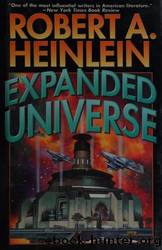Expanded Universe by Heinlein Robert A

Author:Heinlein, Robert A. [Heinlein, Robert A.]
Language: eng
Format: epub
Tags: Politics, SSC, Science Fiction, Fantasy, Anthologies, sf
ISBN: 9780743471596
Amazon: 0743471598
Goodreads: 830965
Publisher: Baen
Published: 1980-10-01T07:00:00+00:00
PANDORA'S BOX
Once opened, the box could never be closed. But after the myriad swarming Troubles came Hope.
Science fiction is not prophecy. It often reads as if it were prophecy; indeed the practitioners of this odd genre (pun intentionalâI won't do it again) of fiction usually strive hard to make their stories sound as if they were true pictures of the future. Prophecies.
Prophesying is what the weatherman does, the race track tipster, the stock market adviser, the fortuneteller who reads palms or gazes into a crystal. Each one is predicting the futureâsometimes exactly, sometimes in vague, veiled, or ambiguous language, sometimes simply with a claim of statistical probability, but always with a claim seriously made of disclosing some piece of the future.
This is not at all what a science fiction author does. Science fiction is almost always laid in the futureâor at least in a fictional possible-futureâand is almost invariably deeply concerned with the shape of that future. But the method is not prediction; it is usually extrapolation and/or speculation. Indeed the author is not required to (and usually does not) regard the fictional "future" he has chosen to write about as being the events most likely to come to pass; his purpose may have nothing to do with the probability that these storied events may happen.
"Extrapolation" means much the same in fiction writing as it does in mathematics: exploring a trend. It means continuing a curve, a path, a trend into the future, by extending its present direction and continuing the shape it has displayed in its past performanceâi.e., if it is a sine curve in the past, you extrapolate it as a sine curve in the future, not as an hyperbola, nor a Witch of Agnesi, and most certainly not as a tangent straight line.
"Speculation" has far more elbowroom than extrapolation; it starts with a "What if?"âand the new factor thrown in by the what-if may be both wildly improbable and so revolutionary in effect as to throw a sine-curve trend (or a yeast-growth trend, or any trend) into something unrecognizably different. What if little green men land on the White House lawn and invite us to join a Galactic union?âor big green men land and enslave us and eat us? What if we solve the problem of immortality? What if New York City really does go dry? And not just the present fiddlin' shortage tackled by fiddlin' quarter-measuresâcan you imagine a man being lynched for wasting an ice cube? Living, as I do, in a state (Coloradoâ1965) which has just two sorts of water, too little and too muchâwe just finished seven years of drought with seven inches of rain in two hours, and one was about as disastrous as the otherâI find a horrid fascination in Frank Herbert's Dune World, in Charles Einstein's The Day New York Went Dry, and in stories about Bible-type floods such as S. Fowler Wright's Deluge.
Most science fiction stories use both extrapolation and speculation. Consider "Blowups Happen," elsewhere in this volume. It
Download
This site does not store any files on its server. We only index and link to content provided by other sites. Please contact the content providers to delete copyright contents if any and email us, we'll remove relevant links or contents immediately.
Sita - Warrior of Mithila (Book 2 of the Ram Chandra Series) by Amish(54874)
The Crystal Crypt by Dick Philip K(36857)
Cat's cradle by Kurt Vonnegut(15341)
Always and Forever, Lara Jean by Jenny Han(14904)
Ready Player One by Cline Ernest(14652)
The Last by Hanna Jameson(10251)
Year One by Nora Roberts(9787)
Persepolis Rising by James S. A. Corey(9352)
The remains of the day by Kazuo Ishiguro(8982)
Never let me go by Kazuo Ishiguro(8882)
Red Rising by Pierce Brown(8763)
Dark Space: The Second Trilogy (Books 4-6) (Dark Space Trilogies Book 2) by Jasper T. Scott(8175)
The handmaid's tale by Margaret Atwood(7759)
The Circle by Dave Eggers(7107)
Frank Herbert's Dune Saga Collection: Books 1 - 6 by Frank Herbert(7066)
The Testaments by Margaret Atwood(6883)
Legacy by Ellery Kane(6654)
Pandemic (The Extinction Files Book 1) by A.G. Riddle(6532)
Six Wakes by Mur Lafferty(6244)
